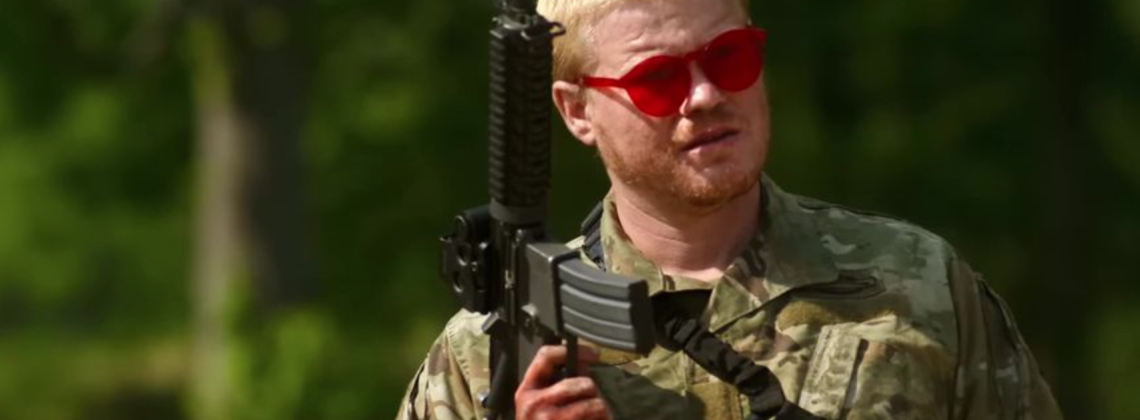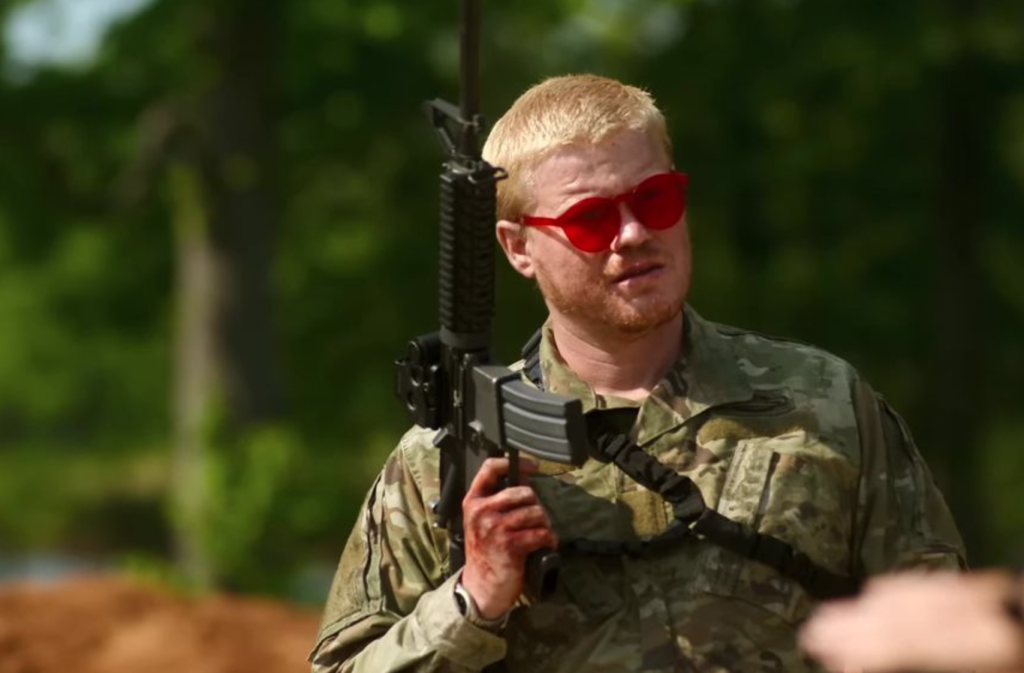

Alex Garland gives us war without politics—or meaning
The weekend after Russia invaded Ukraine I visited Sam’s Club with my kids. Passing the eighty-inch TVs, I marveled that a war was going on halfway around the world. In suburban Orlando, middle-aged fathers like me walked the air-conditioned aisles of big box stores. In Kyiv, they were sending their wives and children to Poland while they stayed to fight the Russians. I wondered what I would do if war came to America. Would I pick up a gun and fight? Or escape abroad with my family?
That’s the question Alex Garland’s Civil War asks. If our comfortable American lives were upended by armed conflict here at home, what would we do?
The movie is set in a twenty-first century America in which nineteen states have seceded and formed regional alliances of which the “Western Forces” alliance of Texas and California is the most powerful. The “United States” is still partially intact, though, led by a president in his Constitution-violating third term.
Despite its marketing as a political thriller with contemporary relevance, the movie is studiously apolitical. The alliance of bright blue California and deep red Texas tells us not to go looking for parallels to life outside the theater.
The movie follows four journalists on a road trip from New York City to Washington, D.C., where they plan to interview the president before the Western Forces topple him from power. There’s veteran war correspondents Joel (Wagner Moura), who wants the “get” of the presidential interview his colleagues deem impossible, and Lee (Kirsten Dunst), a photographer famous for her picture of the “Antifa Massacre.” We neither see the picture nor learn whether Antifa were the victims or the perpetrators. They’re joined by old timer Sammy (Stephen McKinley Henderson), looking to prove he’s still got his reporter chops, and newbie Jessie (Cailee Spaeny), desperate to be a real photojournalist like her idol, Lee, and do something meaningful as the nation collapses around her.
Because I-95 is impassable, they loop through the backcountry of Pennsylvania, West Virginia, and Virginia, all the better to show the war’s impact on exurbs, small towns, and farms. Along the way terrifying scenes of violence are interrupted by the four travelers reflecting quietly on life, war, and journalism. They do not, however, talk about politics. The why of the war doesn’t matter.
Again and again we see the trappings of normal American life juxtaposed with the grotesqueness of war. A helicopter crashed in a JCPenney parking lot. A pleasant development of new houses with their roofs caved in. Graffiti of “Go Steelers” on the girder of a bridge in the foreground while two bodies dangle in the background, like a cartel execution in Juarez. A “Winter Wonderland” Christmas light show at an abandoned golf course with a body lying in the road. A car wash at which what seem to be black fabric flaps for soaping the car turn out to be men in dark clothes suspended by their wrists, beaten and bloody. I got a jolt when they groaned. That’s no car wash I’ve ever seen!
The technique is effective at first, but repetition makes it numbing over time. When a nice farmhouse with red roses in a flowerbox in front has a mass grave out back, it feels like “Well, of course that’s where the mass grave would be.”
The feeling is intended. By stepping away from politics, the movie also removes all context for the atrocities. When pinned down by a sniper, Joel pleads with two nearby soldiers to tell him what side they’re on. They mock him. Doesn’t he know?—the only rule in war is to kill the other guy before he kills you. It’s often said that soldiers don’t fight for a cause but for the man next to them. These soldiers go even further. War is violent nihilism and nothing more.
A similar numbness spreads the more time the journalists spend on screen. In an early scene Lee tells the impressionable Jessie, who’s distraught about not being able to intervene to prevent a murder, to stop asking questions about what she’s photographing. “We record so other people ask,” she lectures. “You want to be a journalist? That’s the job.” When Jessie later takes pictures of a summary execution, Lee sees that her lesson has sunk in.
“We photograph, you decide” is a catchy motto, but it’s not what photojournalists do. They select, they compose, they give meaning to what we see. At the birth of war photography in the real Civil War, photographers like Mathew Brady posed bodies and weapons to maximize the emotional impact on viewers. In the movie, Lee, Jessie, Joel, and Sammy are often in the soldiers’ way, with soldiers distracted from their task by having to move the journalists out of danger, yelling at them to stay back. After the battle is done, Joel chats up guys who’ve just shot a wounded man. Without a larger meaning for their work—again, there’s no politics involved, so no real sense that their pictures will equip anyone to make a decision about anything—the journos are participants, not observers, and increasingly ghoulish because they pretend otherwise. By the end I found them no longer likable.
As I left the theater and stepped into a sunny town center eerily like the warzone in the movie (thankfully no helicopters had crashed next to my car), I thought about my favorite war correspondent, P.J. O’ Rourke. In the 1980s and 1990s, P.J. reported from hot spots like Lebanon, Nicaragua, Panama, Iraq, and Bosnia. I learned half of what I know about the late Cold War and its aftermath from books like Holidays in Hell (1989), Give War a Chance (1992), and All the Trouble in the World (1994).
O’ Rourke was a humorist, but he was also an old-school reporter. He was suitably cynical about American foreign policy. He was, after all, formed by the Vietnam War and campus protest movements of his youth. Yet he always wrote within a moral framework. The United States, for all its flaws, and democratic capitalism, for all its failings, were superior to Soviet communism and its socialist offshoots. Liberty was better than authoritarianism. He thought that way because of what he saw as a war correspondent. He wasn’t like the journalists in Civil War, recording horrors as if that’s enough.
The decision to take politics out of Civil War is understandable from a practical standpoint. Turning off wide swathes of your potential audience by pledging allegiance to team red or team blue is bad for business. I’m grateful not to have been lectured to for an hour and a half, as political movies can do.
But Civil War even avoids any of the politics that would surely exist in a real country at war. There’s no explanation of why the war started, and I still have no idea who the good guys were supposed to be: the rump United States led by a corrupt president? Or the insurgents who blasted their way into the capital? I suppose we’re not supposed to sympathize with anyone. I think that’s meant to signal moral complexity. It ends up feeling more like meaninglessness.
Civil War soldiers of the 1860s, however, knew what they were fighting for. They could be overwhelmed by bloodlust or driven by hatred or a thirst for revenge, but they also understood (in their own ways) what was at stake: liberty, slavery, union, self-determination, and an ideal of America. Even when their ideas were wrong, they thought they were fighting for something.
The movie Civil War gives us Americans fighting for nothing.
David Head is associate lecturer of history at the University of Central Florida and distinguished faculty fellow in history at Kentucky Wesleyan College. He is the co-editor A Republic of Scoundrels: The Schemers, Intriguers, and Adventurers Who Created a New American Nation.
I don’t think it’s the case that the war is presented as *utterly* meaningless. Just from what we know, some states have seceded from the US, which is reason enough to provoke a war from the government to compel their submission (as with the historical Civil War in the beginning).
We also know the president has either altered or defied the Constituion, interfered in the justice department, and bombed Americans. Those things, too, whether technically legal or not in this fictional scenario, would be enough to fuel some hot political passions.
But that all the reasons for the conflict are rendered rather abstract compared to the immediacy of the battlefield sounds quite accurate to me.
Pacific theater veteran E. B. Sledge wrotes in his memoir that those who entered “the meat grinder” of the battlefield found themselves in “a netherworld of horror from which escape seemed less and less likely as casualties mounted and the fighting dragged on and on. Time had no meaning, life had no meaning. The fierce struggle for survival” blotted out everything else.
The film, I thought, rightly reflected that nihilistic progression. Indeed, I think that’s rather central to the movie’s “message,” such as it is.